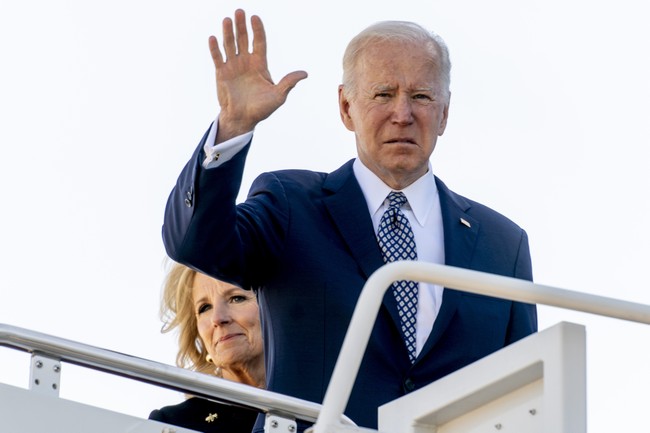


After weeks of pressure and turmoil, President Joe Biden finally announced on Sunday that he is dropping out of the 2024 presidential race.
"It has been the greatest honor of my life to serve as your President,” Biden wrote in a memo posted to X. "And while it has been my intention to seek reelection, I believe it is in the best interest of my party and the country for me to stand down and to focus solely on fulfilling my duties as President for the remainder of my term."
"I will speak to the Nation later this week in more detail about my decision,” he added.
The announcement comes mere days after former President Donald Trump formally accepted the Republican Party nomination for president at the GOP Convention Thursday evening.
It was previously reported Thursday morning that Biden might drop out over the weekend due to mounting pressure from close friends and congressional leaders. The White House and the Biden campaign, however, publicly denied those reports.
Publicly, Biden had been defiant about his intention to stay in the race, but reports suggest that in private, he conceded that the overwhelming pressure, dismal polling numbers, and relentless scrutiny made it impossible for him to continue his campaign. Party leaders, friends, and donors were united in their belief that Biden's chances of winning were slim and that he could not change public perceptions about his age and mental acuity.
Top Democrats had been urging Biden to withdraw, including Rep. Adam Schiff (D-Calif.), former House Speaker Nancy Pelosi (D-Calif.), and Senate Majority Leader Chuck Schumer (D-N.Y.). Reports indicated that Pelosi had been particularly forceful, actively making calls to Democrats to help with the push to encourage Biden to step down. Schumer advised him to step aside during a meeting in Rehoboth Beach, Del., on Saturday. Pelosi warned that his candidacy could jeopardize Democrats' chances of regaining the House and expressed concerns about donations drying up. House Minority Leader Hakeem Jeffries conveyed a similar message.
Biden was warned that remaining in the race could result in a landslide victory for former President Trump, which would obliterate Biden’s legacy and devastate Democrats' prospects in November. Post-debate polls certainly bore this out.
Such a situation is unprecedented and extremely problematic for the Democratic Party. Politically, it will be tough for the party to navigate through this, as Kamala Harris is Biden's heir apparent. However, according to a recent poll, she is the Democrat who performs the worst compared to other Biden alternatives.
There are significant legal hurdles complicating Biden’s potential withdrawal. For example, in Wisconsin, a candidate cannot remove his name from the ballot except in the event of his death. In Nevada, the deadline for ballot changes passed last month and cannot be altered except in cases of death or incapacity. Declaring Biden mentally unfit could trigger a constitutional crisis, potentially leading to calls for his removal via the 25th Amendment, a scenario Biden would likely want to avoid. In Georgia, a candidate can withdraw up to 60 days before the election; withdrawing later would keep his name on the ballot, but votes cast for him would be invalidated. Other states have different rules regarding the timing and reasons for ballot withdrawals, adding further complications to replacing Biden.
The Heritage Foundation's Oversight Project is prepared to launch legal challenges.
"We are monitoring the calls from across the country for President Biden to step aside, either now or before the election, and have concluded that the process for substitution and withdrawal is very complicated," executive director of The Heritage Foundation’s Oversight Project Mike Howell said in a statement. "We will remain vigilant that appropriate election integrity procedures are followed."
With Biden no longer in the race, we likely won't have an official successor until the Democratic National Convention in Chicago in late August. Several Democratic strategists have suggested a transparent process for delegates to assess potential replacement candidates.
This story is developing.
